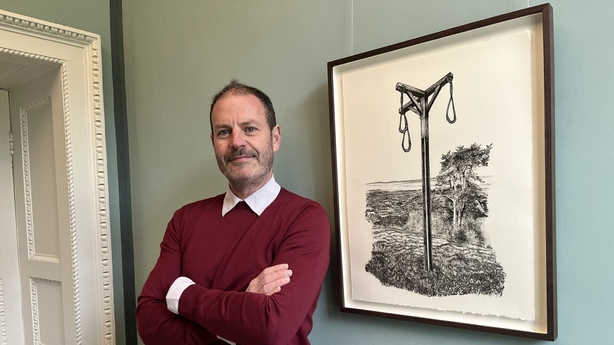A long-lost story from Bram Stoker, the Irish author of one of the world’s best known gothic horror stories ‘Dracula’, has been found in Dublin.
In a remarkable discovery, the short story by Stoker, has been unearthed 130 years after it was first printed.
The haunting tale, titled ‘Gibbet Hill’, was found in the 1890 Christmas supplement of the Dublin Daily Express.
Inexplicably, after the story had first been printed, it disappeared through the mists of time, and remained undocumented, until now.
Gibbet Hill, which has never been referenced in any Stoker bibliography or biography, was discovered by a fellow Dubliner Brian Cleary, a lifelong Stoker enthusiast.
“I was sitting there, in this beautiful room at the National Library on 12 October 2023, holding my breath while I gazed at what I had just found, and I was thinking – am I the only person alive who has read this story?” Mr Cleary told RTÉ News.
Mr Cleary said that he was visiting the National Library of Ireland (NLI) to indulge one of his interests, researching historical literature and the works of Stoker, and while buried in the archives, he uncovered this hidden literary gem.
It is a dark story of a man travelling through the English countryside, who comes across a haunting story involving murders, hangings and demonic and malevolent children.
He explained that he had been searching the British Newspaper Archive at the NLI and had found an advert in the Dublin Daily Express promoting its Christmas supplement.
The supplement had been published on 17 December 1890 and when Mr Cleary kept digging, he uncovered this literary gem.
Enter our Bram Stoker hub – the author of Dracula celebrated
Mr Cleary then continued his research, contacting Stoker biographers and experts who confirmed to him that Gibbet Hill was indeed a lost piece of precious Stoker history and it had never been referenced in any Stoker biographies or research material.
Mr Cleary learnt that Stoker had planned to release three volumes of short stories, and while one was published posthumously by his wife Florence, the other two never appeared in print.
Mr Cleary now believes Stoker most likely planned to include Gibbet Hill in one of these volumes, but that the author died before he finished compiling them.
Paul Murray, a biographer of Stoker’s who has written extensively on the author, told RTÉ News that he was completely satisfied with the authenticity of the piece.
Mr Murray said that “from a literary point of view, it is an important new story as Bram Stoker wrote it just as he was starting to work on Dracula”.

Director of the NLI Dr Audrey Whitty said: “I have a special memory of Brian’s call saying, ‘I’ve found something extraordinary in your newspaper archives – you won’t believe it.”
She added: “There are truly world important discoveries waiting to be found through accessing our vast collections and Brian’s astonishing amateur detective work is a perfect example.”
The emergence of this story also inspired the artist Paul McKinley whose exhibition ‘Péisteanna’ is hanging in the Casino Marino, which is just up the road from Stoker’s birthplace.
Mr McKinley’s paintings evoke the eerie atmosphere of the story and he told RTÉ News that “as an artist I always use a story, and with this one, as it hadn’t been read in 130 years, there was so much detail that I could work with”.
The text of Gibbet Hill is published in a new book and proceeds from it will benefit a charity that is close to Mr Cleary’s heart.
Mr Cleary explained to RTÉ News that he experienced sudden sensorineural hearing loss in 2021, and that it changed his life.
After having cochlear implant surgery, Mr Cleary was on leave from his work so that he could focus on intensive rehabilitation and it was during this period that he spent time at the NLI and devoted hours to indulging his interest in Stoker material.
Mr Cleary works at the Rotunda Hospital and proceeds from his book which centres on Gibbet Hill, will go to the newly-established Charlotte Stoker Fund, dedicated to research on preventable deafness in vulnerable newborns.
The first public reading of this haunting story will take place next Saturday as part of Dublin City Council Bram Stoker Festival 2024.
